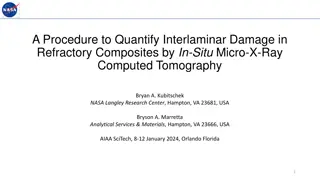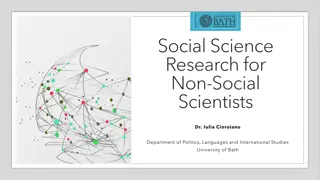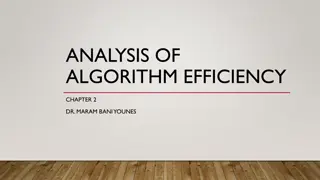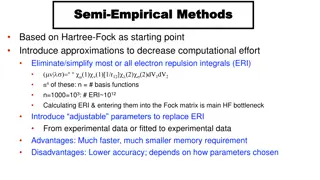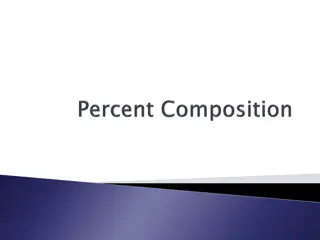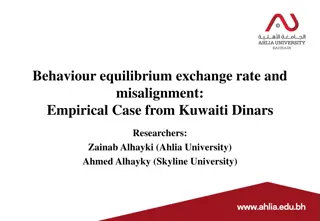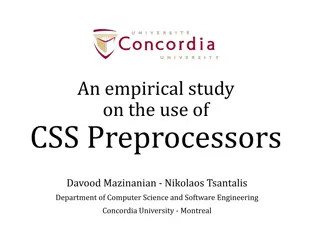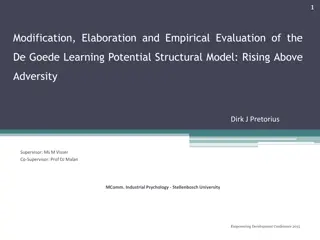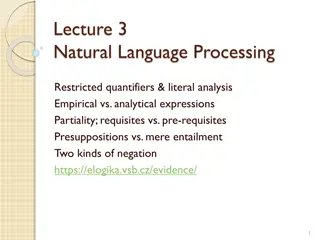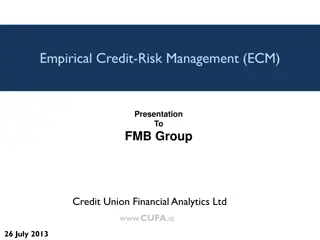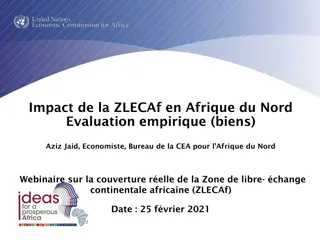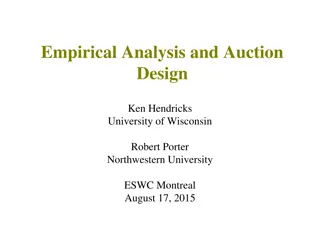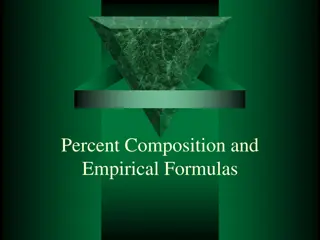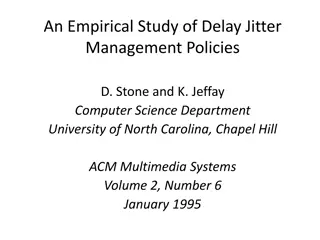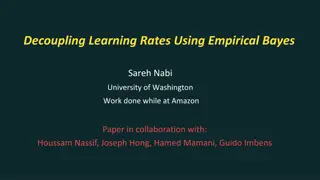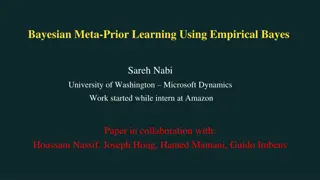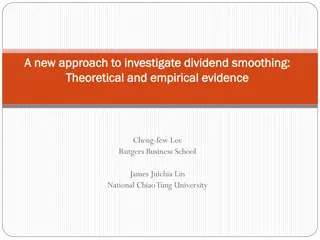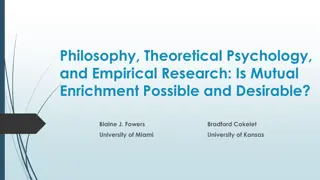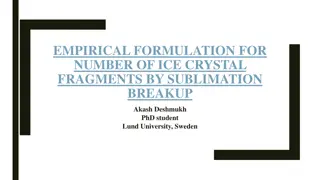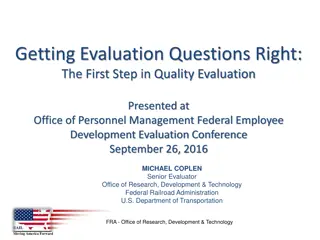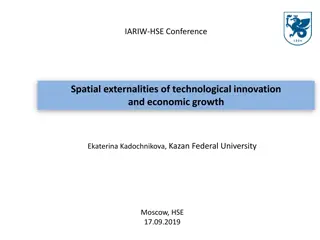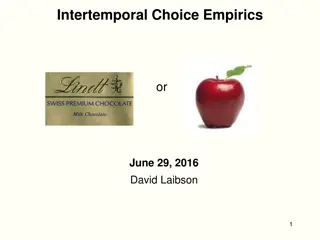Actions Emanating from the Evaluation of the Governance Reform
The evaluation of the governance reform within the WMO aimed to assess its alignment with strategic objectives, effectiveness in responding to societal needs, coordination efficiency, decision-making process, agility, and more. Evaluation criteria included relevance, design validity, effectiveness,
1 views • 13 slides
Procedure for Quantifying Interlaminar Damage in Refractory Composites Using Micro-X-Ray CT
This study presents a method to quantify interlaminar damage in refractory composites through in-situ micro-X-ray computed tomography. The procedure aims to capture the progressive failure in ASTM-sized specimens, providing empirical data for improving simulations of composite materials. Various spe
6 views • 19 slides
Understanding Social Science Research for Non-Social Scientists at University of Bath
This resource delves into social science research fundamentals, encompassing types of inquiry, empirical research categories, primary and secondary research distinctions, and the importance of selecting a suitable research topic. It offers guidance on initiating research based on empirical observati
1 views • 10 slides
Universal Evaluation Framework: Simplifying Evaluation Processes
This session introduces the Universal Evaluation Framework (UEF) developed for evaluating QAA Scotland Enhancement Themes. Participants learn key evaluation questions, evidence capture, and the Theory of Change to enhance evaluation confidence. The QAA Scotland Evaluation Odyssey details historical
2 views • 14 slides
Implementing Blind Evaluation Pilot in HORIZON EUROPE: Key Facts and Process
HORIZON EUROPE is conducting a pilot on Blind Evaluation in the 2023-2024 work program to address biases in the research and innovation evaluation process. The pilot aims to assess the feasibility of blind evaluations in ensuring fairness and mitigating potential biases towards well-known organizati
9 views • 9 slides
Understanding Algorithm Efficiency Analysis
In this chapter, Dr. Maram Bani Younes delves into the analysis of algorithm efficiency, focusing on aspects such as order of growth, best case scenarios, and empirical analysis of time efficiency. The dimensions of generality, simplicity, time efficiency, and space efficiency are explored, with a d
1 views • 28 slides
Exploring Developmental Evaluation for Better Decision-Making
Delve into the realm of developmental evaluation, focusing on its purpose, principles, and application in practice. Understand how developmental evaluation emphasizes real-time data collection for informed decision-making in complex systems. Learn about key principles such as developmental purpose,
0 views • 25 slides
Overview of Semi-Empirical Methods Based on Hartree-Fock
Semi-empirical methods derived from Hartree-Fock theory aim to reduce computational effort by approximating or eliminating electron repulsion integrals. Strategies include introducing adjustable parameters to replace ERI calculations and utilizing zero differential overlap methods like CNDO, INDO, N
1 views • 11 slides
Parallel Implementation of Multivariate Empirical Mode Decomposition on GPU
Empirical Mode Decomposition (EMD) is a signal processing technique used for separating different oscillation modes in a time series signal. This paper explores the parallel implementation of Multivariate Empirical Mode Decomposition (MEMD) on GPU, discussing numerical steps, implementation details,
1 views • 15 slides
Enhancing Evaluation Capabilities in Mongolia for Agenda 2030
The Mongolian Evaluation Network in collaboration with UNDP is working to integrate the 2030 Agenda into national strategies and plans, establish institutional coordination mechanisms, align budgets, and enhance data monitoring systems. Key stakeholders including government agencies, NGOs, and inter
0 views • 9 slides
Understanding Percent Composition and Empirical Formulas in Chemistry
The Law of Definite Proportions governs the composition of compounds based on molar masses, allowing us to calculate percentage compositions of elements within a compound. Through examples involving various compounds like Fe3C, sulfur dioxide, ammonium nitrate, glucose, and acetic acid, we explore t
3 views • 7 slides
Understanding Evaluation in Education
Evaluation in education is a comprehensive term that encompasses measurement, testing, and qualitative examination of student behavior. It involves both quantitative and qualitative descriptions, along with value judgments. Differentiating from mere measurement, evaluation provides a deeper analysis
0 views • 28 slides
Empirical Research on Surrogacy in New Zealand: Key Findings
Associate Professor Debra Wilson from the University of Canterbury in New Zealand conducted empirical research on public opinions regarding surrogacy. The findings revealed three surprising results, including perspectives on surrogates being compensated, the importance of genetics in surrogacy arran
0 views • 11 slides
Generalization of Empirical Risk Minimization in Stochastic Convex Optimization by Vitaly Feldman
This study delves into the generalization of Empirical Risk Minimization (ERM) in stochastic convex optimization, focusing on minimizing true objective functions while considering generalization errors. It explores the application of ERM in machine learning and statistics, particularly in supervised
0 views • 11 slides
Empirical Analysis of Kuwaiti Dinar Exchange Rate Behavior and Misalignment
This research focuses on studying the behavior of the real equilibrium exchange rate (REER) of Kuwaiti Dinars, estimating the equilibrium exchange rate using the BEER model, and calculating real exchange misalignments (RERM). It delves into the impact of exchange rate fluctuations on macroeconomic v
0 views • 15 slides
Sustainable Evaluation Systems Workshop Summary
Workshop on Sustainable Evaluation Systems by Stephen Porter at the NEC Conference focused on defining evaluation systems, addressing their failures, and emphasizing the importance of quality, use, and networks in achieving sustainability. Participants engaged in activities such as bingo card introd
0 views • 38 slides
History of Chemotherapy: From Empirical Use to Modern Era
The history of chemotherapy is divided into three phases, starting from the empirical use of compounds in ancient times to the modern era marked by targeted drug development. Ehrlich's pioneering work in the late 19th to early 20th centuries laid the foundation for understanding the selective toxici
0 views • 15 slides
Impact and Evaluation Toolkit for Churches and Christian Charities
This toolkit aims to equip churches and Christian charities engaged in small-scale social action projects to think about impact, measure impact, choose data tools, reflect on evaluation data, and use it effectively. It covers principles of evaluation, setting objectives, selecting indicators, storyt
0 views • 34 slides
Empirical Study on CSS Preprocessors: Insights and Findings
Exploring the utilization of CSS preprocessors in web development through an empirical study conducted by Davood Mazinanian and Nikolaos Tsantalis from Concordia University. The study delves into the motivations behind using CSS preprocessors, developers' preferences, features offered by preprocesso
0 views • 24 slides
Empirical Evaluation of De Goede Learning Potential Model
This research paper focuses on the modification and extension of the De Goede Learning Potential Structural Model, aiming to identify non-cognitive variables influencing learning potential. Through model development, hypothesis testing, and empirical evaluation, the study explores factors such as In
0 views • 12 slides
Overview of Monitoring and Evaluation in the GEF
The Evaluation in the GEF and Training Module focuses on promoting accountability and learning within the Global Environment Facility (GEF) through monitoring and evaluation activities. The GEF Independent Evaluation Office plays a crucial role in assessing results, effectiveness, and performance of
0 views • 25 slides
Understanding Empirical vs Analytical Expressions in Natural Language Processing
Restricted quantifiers and literal analysis in natural language processing reveal the distinctions between empirical and analytical expressions. While empirical expressions refer to non-trivial intensions that require empirical investigation, analytical expressions denote constant intensions that ca
1 views • 19 slides
Developing an Evaluation Work Plan for Effective Program Assessment
This presentation by Amy D. Andrade from San Jose State University focuses on developing an Evaluation Work Plan to identify responsibilities and timelines. It covers topics such as Evaluation Coaching Support, Webinar Outlines, Logic Model, Inputs-Outputs-Outcomes, Two Approaches to Evaluation, Pro
0 views • 29 slides
Empirical Credit Risk Management at FMB Group Credit Union
Empirical Credit-Risk Management (ECM) presentation to FMB Group Credit Union by Financial Analytics Ltd discusses the background, traditional forecasting methods, income and risk recognition, provisioning approaches, and benefits for credit unions. ECM offers expert retail credit risk management th
0 views • 25 slides
Evaluation Synthesis in Changing Contexts: Enhancing Knowledge for Development Effectiveness
Evaluation synthesis is crucial for promoting learning, reflection, and decision-making in development work. This process involves bringing together diverse knowledge sources to generate strategic insights and facilitate wider use of evaluation findings. The Independent Office of Evaluation of IFAD
0 views • 20 slides
Evaluation of FME Zero Emission Neighbourhoods in Smart Cities
The mid-term evaluation process of FME Zero Emission Neighbourhoods in Smart Cities involves self-evaluation, partner evaluation, and panel evaluation. The procedure includes scientific review, evaluation by scholars, and innovation assessment. Key documents like self-reports, progress reports, and
1 views • 20 slides
Impact of ZLECAf in North Africa: Empirical Evaluation
The Economist, Aziz Jaid, from the CEA Bureau for North Africa conducted an empirical evaluation on the impact of the ZLECAf in North Africa, focusing on goods. The context includes coverage of seven countries, the rationale behind the ZLECAf agreement, and details on the liberalization scenarios an
0 views • 13 slides
Overview of Regular Evaluation 2017 Findings in Estonia
In the Regular Evaluation 2017, efforts were made to maximize the benefits of evaluation outcomes for various stakeholders in Estonia such as the state, society, and institutions. The evaluation focused on a range of actions including preparing legislation, finding experts, creating self-report form
0 views • 6 slides
Understanding Auction Design: Empirical Analysis and Practical Insights
Auctions play a crucial role in various sectors due to their efficiency in price discovery and resource allocation. This article delves into auction design issues, the role of structural analysis, and the transformative Laffont program. Discover the importance of empirical analysis in optimizing auc
0 views • 59 slides
Understanding Percent Composition and Empirical Formulas
Explore the concept of percent composition, empirical formulas, and how to determine them through examples. Learn how to convert percentages to grams, calculate moles, and find the simplest ratio among elements in a compound.
0 views • 9 slides
An Empirical Study of Delay Jitter Management Policies
This study explores delay jitter management policies to support interactive audio over LANs, focusing on display queue management to minimize gaps in playout. The paper evaluates different queue management policies, including I-policy and E-policy, along with queue monitoring in the context of an em
0 views • 37 slides
Decoupling Learning Rates Using Empirical Bayes: Optimization Strategy
Decoupling learning rates through an Empirical Bayes approach to optimize model convergence: prioritizing first-order features over second-order features improves convergence speed and efficiency. A detailed study on the impact of observation rates on different feature orders and the benefits of seq
0 views • 25 slides
Bayesian Meta-Prior Learning Using Empirical Bayes: A Framework for Sequential Decision Making Under Uncertainty
Explore the innovative framework proposed by Sareh Nabi at the University of Washington for Bayesian meta-prior learning using empirical Bayes. The framework aims to optimize ad layout and classification problems efficiently by decoupling learning rates of model parameters. Learn about the Multi-Arm
0 views • 27 slides
Comprehensive Guide to Training Evaluation Methods
This detailed guide covers the aim of evaluation, evaluation methods, techniques of evaluation, types of evaluation (formative, process, outcome, impact), and the significance of formative and process evaluation in assessing training effectiveness. Learn about the key principles and practices involv
0 views • 45 slides
Investigating Dividend Smoothing: Theoretical & Empirical Analysis
Dividend smoothing behavior in corporate finance is investigated through the partial adjustment and information content hypotheses. A new integrated model is proposed to evaluate dividend smoothing behaviors, contributing to a deeper understanding of firm tendencies to smooth dividends. Empirical ev
0 views • 21 slides
The Interplay Between Theoretical Psychology and Empirical Research
Exploring the potential for collaboration between philosophy, theoretical psychology, and empirical research, this article delves into the historical divide, recent renaissance, and avenues for mutual enrichment. It raises questions about how each discipline can contribute to and benefit from the ot
0 views • 16 slides
Empirical Formulation for Ice Crystal Fragmentation by Sublimation Breakup Study
This study by Akash Deshmukh at Lund University delves into the empirical formulation for the number of ice crystal fragments resulting from sublimation breakup. It discusses secondary ice production mechanisms, challenges in numerical formulation, observational bases, previous studies, and cloud de
0 views • 7 slides
Understanding Evaluation Questions for Quality Assessment in Federal Programs
Presentation by Michael Coplen at the Office of Personnel Management Federal Employee Development Evaluation Conference focused on the importance of developing quality evaluation questions, common flaws, and driving actionable evaluation by using evidence and rigorous criteria. The session highlight
0 views • 35 slides
Spatial Externalities of Technological Innovation and Economic Growth: Empirical Study
This study explores the spatial externalities of technological innovation and economic growth, focusing on the convergence of growth rates in different regions. It delves into the impact of knowledge capital, patents, human capital, and internet development on regional growth rates. Various theories
0 views • 26 slides
Empirical Studies on Intertemporal Choice by David Laibson
This collection of empirical studies explores intertemporal choice behavior, focusing on preference reversals, commitment, and other related concepts. The studies reveal how individuals exhibit time-inconsistent preferences when making decisions about future and present outcomes, showcasing examples
0 views • 49 slides

